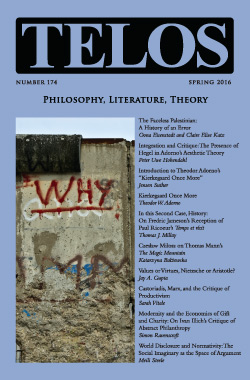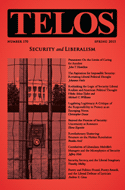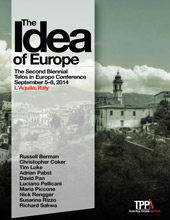By Katarzyna Bałżewska · Thursday, March 31, 2016 This article presents the connections between the Polish poet Czesław Miłosz and Thomas Mann’s The Magic Mountain. Miłosz’s fascination with the German novel, which has its roots in the 1930s, changed profoundly over the decades. Not only did the poet ponder on the immense intellectual value of The Magic Mountain, but he also turned to it eagerly as a form of literary “substance” and inspiration for his own works (The Seizure of Power, A Magic Mountain). The novel left deep marks on the author of The Captive Mind, because throughout his whole life he sought references to his own life in the fictitious events and characters from Mann’s story. The chosen fragments of texts and conversations with the Polish poet enable us to investigate the history of the extraordinary connection between Miłosz and this twentieth-century epic masterpiece, indicating at the same time the key moments of this “literary relationship.”
Continue reading →
By Meili Steele · Tuesday, March 29, 2016 There has been an ongoing dispute between defenders of world disclosure (understood here in a loosely Heideggerian sense) and advocates of normative debate. I will take up a recent confrontation between Charles Taylor and Robert Brandom over this question as my point of departure for showing how world disclosure can expand the range of normative argument. I begin by distinguishing pre-reflective disclosure—the already interpreted, structured world in which we find ourselves—from reflective disclosure—the discrete intervention of a particular utterance or text. I discuss Taylor’s notion of social imaginaries as a way of thematizing our pre-reflective background and Talal Asad’s critique of Taylor to show how this background can be one space of argument. I then develop my own understanding of reflective disclosure, of which Taylor gives an inadequate account, developing my argument with help of literature, including a close analysis of Susan Glaspell short story “A Jury of Her Peers.” This story illustrates how world disclosure can make normative arguments without confining itself to Brandom’s or Habermas’s idea of the exchange of reasons.
Continue reading →
By Russell A. Berman · Monday, March 14, 2016 Telos 174 (Spring 2016): Philosophy, Literature, Theory is now available for purchase in our store.
 In this issue, Telos turns to a diverse set of philosophers, contemporary and classical, and questions, concerning ethics and politics on the one hand, and literature and aesthetics on the other. More often than not, those distinctions turn out to be difficult to maintain. A case in point is the opening essay, which examines how statements by Levinas have been subjected to political readings in order to impute to him positions that he did not hold. What are the ethics of intentional misreadings? In their meticulously argued analysis, Oona Eisenstadt and Claire Elise Katz demonstrate how the philosopher’s comments in a 1982 radio interview, in the immediate aftermath of the massacres in the Sabra and Shatila refugee camps in Lebanon, have been subjected to increasing degrees of misrepresentation, culminating in false accusations that he justified the killings. These insinuations involved fabricating quotations to put words in his mouth. Eisenstadt and Katz expose the poor philology and tendentious politics implicit in such distortion. In this issue, Telos turns to a diverse set of philosophers, contemporary and classical, and questions, concerning ethics and politics on the one hand, and literature and aesthetics on the other. More often than not, those distinctions turn out to be difficult to maintain. A case in point is the opening essay, which examines how statements by Levinas have been subjected to political readings in order to impute to him positions that he did not hold. What are the ethics of intentional misreadings? In their meticulously argued analysis, Oona Eisenstadt and Claire Elise Katz demonstrate how the philosopher’s comments in a 1982 radio interview, in the immediate aftermath of the massacres in the Sabra and Shatila refugee camps in Lebanon, have been subjected to increasing degrees of misrepresentation, culminating in false accusations that he justified the killings. These insinuations involved fabricating quotations to put words in his mouth. Eisenstadt and Katz expose the poor philology and tendentious politics implicit in such distortion.
Continue reading →
By Michael Allan · Friday, December 11, 2015 For scholars of religion and literature, Michel Houellebecq’s Submission glimmers like a shiny lure. The storyline contains the sorts of details that appeal to an easy and seductive journalistic gloss. The year is 2022. A charismatic Muslim prime minister is elected in France, and an almost caricatured series of events follows: men and women are separated; the university president converts to Islam and weds a young wife; professors are coerced to convert or retire early; and so on. Add to the plot Houellebecq’s professed Islamophobia and the massacre at Charlie Hebdo, and you have the ingredients of a newsworthy book to be addressed by critics, journalists, and readers across the world. Like a number of reviewers, I initially found myself lured to consider religion, secularism, and contemporary French politics against the backdrop of the newly published English translation. But as I began reading, I was confronted with a challenge of a different sort.
Continue reading →
 When Edward Snowden, on June 9, 2013, revealed his identity in a video interview posted on the website of the Guardian, he invoked the intellectual framework of liberalism in order to explain why he had leaked a massive trove of secret documents about the spying and data collection practices of the National Security Administration (NSA) and its partner agencies. Having regularly witnessed the legal abuses of the NSA as a technical assistant for the CIA and, subsequently, as an employee of the defense contractor Booz Allen Hamilton, Snowden explained that “over time [the] awareness of wrongdoing builds up and you feel compelled to talk about it . . . until eventually you realize that these things need to be determined by the public, not by somebody who’s simply hired by the government.” When Edward Snowden, on June 9, 2013, revealed his identity in a video interview posted on the website of the Guardian, he invoked the intellectual framework of liberalism in order to explain why he had leaked a massive trove of secret documents about the spying and data collection practices of the National Security Administration (NSA) and its partner agencies. Having regularly witnessed the legal abuses of the NSA as a technical assistant for the CIA and, subsequently, as an employee of the defense contractor Booz Allen Hamilton, Snowden explained that “over time [the] awareness of wrongdoing builds up and you feel compelled to talk about it . . . until eventually you realize that these things need to be determined by the public, not by somebody who’s simply hired by the government.”
Continue reading →
By Jill Suzanne Smith · Monday, October 13, 2014  As the first wars to be waged on European soil since the Second World War, the Balkan crises constituted a defining moment for post-Cold War Europe, and particularly for the newly united nation at its center: Germany. The political and humanitarian crises that ravaged the former Yugoslavia between 1991 and 1999 had a significant impact on migration patterns to Germany; the BRD took in 48% of all refugees from the war-torn region, vastly more than any other European country. This was not just a test of whether or not Germany would welcome migrants, a large portion of whom were Muslims. It was also a test of how Germany, in light of its own genocidal past, would react to the Serbian policy of “ethnic cleansing” and how it would treat its position in NATO, a membership that would cause the first mobilization of German troops since World War II. When we consider these various factors and dilemmas, Germany’s role in the conflict is certainly fraught, especially when we recall that the German government under Helmut Kohl and Hans-Dietrich Genscher exacerbated the Yugoslav crisis through its hasty recognition of Slovenia and then of its World War II ally Croatia as independent states. These decisions undermined the legitimacy of the Yugoslavian multiethnic state and set off a chain reaction that led first to the evacuation of Serbs from the new Croatian nation and eventually to the ethnic cleansing of Bosnian Muslims by Serbs.[1] As the first wars to be waged on European soil since the Second World War, the Balkan crises constituted a defining moment for post-Cold War Europe, and particularly for the newly united nation at its center: Germany. The political and humanitarian crises that ravaged the former Yugoslavia between 1991 and 1999 had a significant impact on migration patterns to Germany; the BRD took in 48% of all refugees from the war-torn region, vastly more than any other European country. This was not just a test of whether or not Germany would welcome migrants, a large portion of whom were Muslims. It was also a test of how Germany, in light of its own genocidal past, would react to the Serbian policy of “ethnic cleansing” and how it would treat its position in NATO, a membership that would cause the first mobilization of German troops since World War II. When we consider these various factors and dilemmas, Germany’s role in the conflict is certainly fraught, especially when we recall that the German government under Helmut Kohl and Hans-Dietrich Genscher exacerbated the Yugoslav crisis through its hasty recognition of Slovenia and then of its World War II ally Croatia as independent states. These decisions undermined the legitimacy of the Yugoslavian multiethnic state and set off a chain reaction that led first to the evacuation of Serbs from the new Croatian nation and eventually to the ethnic cleansing of Bosnian Muslims by Serbs.[1]
Continue reading →
|
|

 When Edward Snowden, on June 9, 2013, revealed his identity in a video interview posted on the website of the Guardian, he invoked the intellectual framework of liberalism in order to explain why he had leaked a massive trove of secret documents about the spying and data collection practices of the National Security Administration (NSA) and its partner agencies. Having regularly witnessed the legal abuses of the NSA as a technical assistant for the CIA and, subsequently, as an employee of the defense contractor Booz Allen Hamilton, Snowden explained that “over time [the] awareness of wrongdoing builds up and you feel compelled to talk about it . . . until eventually you realize that these things need to be determined by the public, not by somebody who’s simply hired by the government.”
When Edward Snowden, on June 9, 2013, revealed his identity in a video interview posted on the website of the Guardian, he invoked the intellectual framework of liberalism in order to explain why he had leaked a massive trove of secret documents about the spying and data collection practices of the National Security Administration (NSA) and its partner agencies. Having regularly witnessed the legal abuses of the NSA as a technical assistant for the CIA and, subsequently, as an employee of the defense contractor Booz Allen Hamilton, Snowden explained that “over time [the] awareness of wrongdoing builds up and you feel compelled to talk about it . . . until eventually you realize that these things need to be determined by the public, not by somebody who’s simply hired by the government.”  As the first wars to be waged on European soil since the Second World War, the Balkan crises constituted a defining moment for post-Cold War Europe, and particularly for the newly united nation at its center: Germany. The political and humanitarian crises that ravaged the former Yugoslavia between 1991 and 1999 had a significant impact on migration patterns to Germany; the BRD took in 48% of all refugees from the war-torn region, vastly more than any other European country. This was not just a test of whether or not Germany would welcome migrants, a large portion of whom were Muslims. It was also a test of how Germany, in light of its own genocidal past, would react to the Serbian policy of “ethnic cleansing” and how it would treat its position in NATO, a membership that would cause the first mobilization of German troops since World War II. When we consider these various factors and dilemmas, Germany’s role in the conflict is certainly fraught, especially when we recall that the German government under Helmut Kohl and Hans-Dietrich Genscher exacerbated the Yugoslav crisis through its hasty recognition of Slovenia and then of its World War II ally Croatia as independent states. These decisions undermined the legitimacy of the Yugoslavian multiethnic state and set off a chain reaction that led first to the evacuation of Serbs from the new Croatian nation and eventually to the ethnic cleansing of Bosnian Muslims by Serbs.[1]
As the first wars to be waged on European soil since the Second World War, the Balkan crises constituted a defining moment for post-Cold War Europe, and particularly for the newly united nation at its center: Germany. The political and humanitarian crises that ravaged the former Yugoslavia between 1991 and 1999 had a significant impact on migration patterns to Germany; the BRD took in 48% of all refugees from the war-torn region, vastly more than any other European country. This was not just a test of whether or not Germany would welcome migrants, a large portion of whom were Muslims. It was also a test of how Germany, in light of its own genocidal past, would react to the Serbian policy of “ethnic cleansing” and how it would treat its position in NATO, a membership that would cause the first mobilization of German troops since World War II. When we consider these various factors and dilemmas, Germany’s role in the conflict is certainly fraught, especially when we recall that the German government under Helmut Kohl and Hans-Dietrich Genscher exacerbated the Yugoslav crisis through its hasty recognition of Slovenia and then of its World War II ally Croatia as independent states. These decisions undermined the legitimacy of the Yugoslavian multiethnic state and set off a chain reaction that led first to the evacuation of Serbs from the new Croatian nation and eventually to the ethnic cleansing of Bosnian Muslims by Serbs.[1] 

